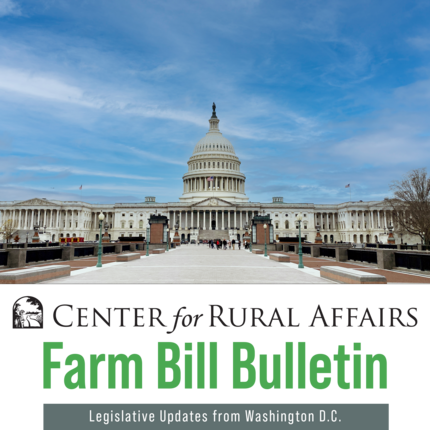After months of anticipation, the U.S. House and Senate agriculture committees have taken initial steps in the long process of passing a new farm bill. The committees have been working on their respective versions since September after Congress approved an extension of the 2018 farm bill.
Earlier this month, Agriculture Committee Chair G.T. Thompson released a summary of the House bill, followed by the full draft—or “mark”—on May 17. Agriculture Committee Chair Debbie Stabenow released the Senate’s bill summary on May 1.
Each proposal outlines changes to all 12 titles of the current farm bill, ranging from conservation and crop insurance to nutrition and rural development. Passing these bills out of their respective committees must occur before either is presented to the full House or Senate floor.
On May 24, the House Agriculture Committee was the first to take this step, passing the Farm, Food, and National Security Act of 2024 on a 33-21 vote. The bill was passed along party lines with the support of four Democrats.
The Senate Agriculture Committee has not set a date for debate and a vote on its bill.
Below are two topics of interest our staff will be monitoring in the months ahead.
Conservation funding: Since farm bill negotiations began, conservation funding—specifically money for working lands conservation programs allocated through the Inflation Reduction Act (IRA)—has been at the forefront of discussion. In a win for the agriculture community, both chambers have agreed that this historic funding should be rescinded from the IRA and built into the farm bill baseline, ensuring the money will grow and be available to producers implementing conservation practices over time.
The conflict, however, is whether or not to maintain the “climate guardrails” established by the IRA. The House bill removes the stipulation that IRA dollars solely fund climate smart agriculture and forestry practices, such as cover crops, no-till, and prescribed grazing. The Senate Agriculture Committee, on the other hand, is supportive of maintaining these guardrails.
Rural development: In a big win for small business owners, the House bill includes reauthorization of and improvements to the Rural Microentrepreneur Assistance Program (RMAP) outlined in the Rural Microentrepreneur Assistance Act of 2023. In addition to reauthorizing the program for five years, the bill would raise the loan cap from $50,000 to $75,000, allow entrepreneurs to renovate existing buildings, and allow lenders to fully fund loans using RMAP dollars. These changes are also outlined in the Senate summary.
If you would like to contact your U.S. representative or senators to express support for conservation funding or rural small businesses, please email [email protected]. You can find contact information for your members of Congress here.




